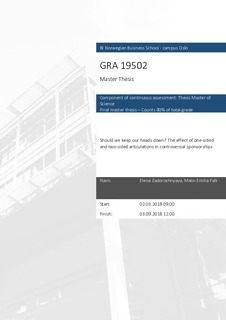| dc.description.abstract | One of the fundamental characteristics that differ a successful sponsorship
from a failed one is its ability to not only create a desired corporate image for the
target audience but also tap into their psychology. Ideally, it touches the mind,
triggers feelings and emotions, and ultimately becomes associated with the values
and beliefs that the customers hold. The strategy of using controversial subjects in
sponsorships and communications as a mean to trigger strong emotions has
recently been seen blooming up again as a result of a shifting political climate.
Controversial political issues have been used in marketing by such well-known
brands as United Colors of Benetton and Budweiser. However, brands’ customer
base often holds polarized opinions regarding the controversial issues being used,
which in many cases leads to a twofold effect. Using controversy in marketing
activities has shown to result in both boycotts from the disagreeing consumers and
positive reactions from those who agree. These consequences raise the question of
whether Brand Managers should use controversy as a means to build their brand,
and whether adverse effects can be minimized. Previous communication research
finds that a two-sided articulation presenting both positive and negative sides of
the cause can be used when consumers hold an attitude opposing the intent of the
message, in order to change their attitude in a more favorable direction. The
current research contributes to the topic by testing how one-sided and two-sided
articulations work in the context of a controversial sponsorship and if this could
be used to mitigate the potential negative effects that appear when customers have
polarized opinions. The study, with some limitations, found results indicating that
marketers should not expect one-sided and two-sided articulations to have the
same positive results in a controversial context as it would have in a noncontroversial
one. One-sided articulation, even though touching upon positive or
negative aspects of the controversy, doesn’t seem to minimize the negative effect
it has on people who are against the controversial cause. Specifically, if people
have negative attitude towards the controversy, this negative effect is transferred
to the perception of sponsorship and persists regardless of the articulation.
However, not all the research goals were met since the study has some potential
confounds. Based on this the researchers also identified the main limitations and
made suggestions for further improvement. | nb_NO |
